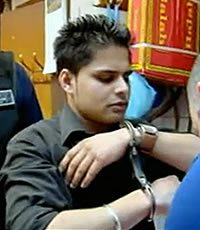Award winning, Bhangra singer, Garry Sandhu was taken into custody on 27th October 2011 by the UK Border Agency for not fulfilling his right to stay in the UK. Implying that the singer was here on an illegal basis.

 The singer recently performed live at the Brit Asia Awards 2011 at Hammersmith Apollo and at many melas in the UK, including the London Mela. His songs like ‘Sahan To Pyariya’ and ‘Tohar’ recieved a tremendous response. In a recent interview, he said he worked as a brick layer and builder, and decided to pursue a singing career because of the response of his fans and huge ethnic media support such as from Raaj FM, BBC Asian Network and Brit Asia.
The singer recently performed live at the Brit Asia Awards 2011 at Hammersmith Apollo and at many melas in the UK, including the London Mela. His songs like ‘Sahan To Pyariya’ and ‘Tohar’ recieved a tremendous response. In a recent interview, he said he worked as a brick layer and builder, and decided to pursue a singing career because of the response of his fans and huge ethnic media support such as from Raaj FM, BBC Asian Network and Brit Asia. Prior to ‘Main Ni Peenda’ he did attempt a track with music producer Jeeti which was a version of ‘Dil De Deh’ which was not released but was subsequently, re-produced in collaboration with Roachkilla. DJH produced ‘Sahan To Pyariya’ which was a huge hit for Sandhu.
Prior to ‘Main Ni Peenda’ he did attempt a track with music producer Jeeti which was a version of ‘Dil De Deh’ which was not released but was subsequently, re-produced in collaboration with Roachkilla. DJH produced ‘Sahan To Pyariya’ which was a huge hit for Sandhu.

"if someone says are you a freshie, I say yes I'm freshie, so what?"
Garry Sandhu, the Brit-Asia award winning singer has been arrested by the UK Border Agency for violating UK immigrations laws. It is revealed that he has not honoured his status to leave the country on a voluntary basis after not having the right to stay in the UK.
Gurmukh Singh Sandhu (Garry Sandhu), the winner of the Best Newcomer and Best Male Act at the recent Brit Asia Awards 2011, was arrested and taken into custody on 27th October 2011.
Ironically, his latest song and video called ‘Fresh’ was based on being a ‘Freshie’ and ‘foji’ which relates to a person who is ‘fresh of the boat’ from India, Punjab. The news of him being an illegal immigrant indicates how close he to the subject matter of the song.
This news will be a shock to the Asian music industry and his fans who saw Garry Sandhu as a new rising star on the scene.
DESIblitz.com can fully confirm the arrest after receiving an email statement from the UK Border Agency. Toby Allanson from the UK Border Agency in the statement said:
“We can confirm an Indian national was detained yesterday in the West Midlands area. When someone is found not to have a right to remain in the UK, we expect them to leave voluntarily. If they fail to do so, we will seek to enforce their removal.”
 The singer recently performed live at the Brit Asia Awards 2011 at Hammersmith Apollo and at many melas in the UK, including the London Mela. His songs like ‘Sahan To Pyariya’ and ‘Tohar’ recieved a tremendous response. In a recent interview, he said he worked as a brick layer and builder, and decided to pursue a singing career because of the response of his fans and huge ethnic media support such as from Raaj FM, BBC Asian Network and Brit Asia.
The singer recently performed live at the Brit Asia Awards 2011 at Hammersmith Apollo and at many melas in the UK, including the London Mela. His songs like ‘Sahan To Pyariya’ and ‘Tohar’ recieved a tremendous response. In a recent interview, he said he worked as a brick layer and builder, and decided to pursue a singing career because of the response of his fans and huge ethnic media support such as from Raaj FM, BBC Asian Network and Brit Asia.It’s evident from the arrest that Garry was not here in the UK on legitimate terms and if proven, the chances are he will be deported back to India. Gary was living and working in Handsworth, a very ethnically rich area of Birmingham.
Garry started his music career in the UK after he was given support by Jas Sandhu who gave him work in catering initially and and then subsequently, became his manager. Garry was introduced to Pamma Sohal by Jas who helped him record and release his first song and music video with music producer Kam Frantic, called ‘Main Ni Peenda’ which brought him attention as a Punjabi singer.
 Prior to ‘Main Ni Peenda’ he did attempt a track with music producer Jeeti which was a version of ‘Dil De Deh’ which was not released but was subsequently, re-produced in collaboration with Roachkilla. DJH produced ‘Sahan To Pyariya’ which was a huge hit for Sandhu.
Prior to ‘Main Ni Peenda’ he did attempt a track with music producer Jeeti which was a version of ‘Dil De Deh’ which was not released but was subsequently, re-produced in collaboration with Roachkilla. DJH produced ‘Sahan To Pyariya’ which was a huge hit for Sandhu.Garry an avid user of Facebook with over 14,000 fans of his page, appeared on many television shows, on numerous interviews and features on a dedicated YouTube channel. Therefore, he was very much in the public eye and performed at many events and functions up and down the country.
Garry openly proud of being a ‘freshie’ himself said:”Proud to be freshie. Okay I’m a freshie but if some one says it behind my back then it hurts me, if someone says are you a freshie, I say yes I’m freshie, so what?”
Therefore, many people will wonder how can an artist like this present himself openly in the manner but also be an illegal immigrant at the same time? This is a question amongst many others that will need answers from Garry, especially for fans of his music who have given him trust, love and support for him as a person and a singer.

 Divorce in South Asian society was once a very taboo subject and very seldom heard of, even in the UK. Older Asian generations that migrated to the UK, got married at a young age, usually in the form of arranged marriages and had children very soon after. The nucleus of the home was the family and subsequently, the extended family. Mothers usually stayed at home looking after and bringing up children and the father was seen as the head of the household and usually the income provider. A framework that defined roles, responsibilities and the foundation to the relationship of a migrant couple.
Divorce in South Asian society was once a very taboo subject and very seldom heard of, even in the UK. Older Asian generations that migrated to the UK, got married at a young age, usually in the form of arranged marriages and had children very soon after. The nucleus of the home was the family and subsequently, the extended family. Mothers usually stayed at home looking after and bringing up children and the father was seen as the head of the household and usually the income provider. A framework that defined roles, responsibilities and the foundation to the relationship of a migrant couple. No longer were many Brit-Asian men and women thinking in the same way as their grandparents or parents. They felt part of mainstream British society much more comfortably than previous generations. This led to marriage not becoming the priority in their lives because careers, business and status took centre stage. The era of professional Brit-Asians was upon us.
No longer were many Brit-Asian men and women thinking in the same way as their grandparents or parents. They felt part of mainstream British society much more comfortably than previous generations. This led to marriage not becoming the priority in their lives because careers, business and status took centre stage. The era of professional Brit-Asians was upon us. These changes have impacted family life, breaking the nucleus that was once prominent in Asian households. Brit-Asian marriages were primarily seen as the uniting of families rather than just two people and were strongly held together through guidance and support from families. However, marriages today, are more the unity of the couple rather than the families.
These changes have impacted family life, breaking the nucleus that was once prominent in Asian households. Brit-Asian marriages were primarily seen as the uniting of families rather than just two people and were strongly held together through guidance and support from families. However, marriages today, are more the unity of the couple rather than the families. British Asian marriages are collapsing at an alarming rate. Many within the first year of marriage and often include couples that have dated for a long period prior to marriage too.
British Asian marriages are collapsing at an alarming rate. Many within the first year of marriage and often include couples that have dated for a long period prior to marriage too. Brit-Asian divorces are generally breaking families into an ethnic society of single parent mothers and isolated fathers. Children are growing up with disjointed parenting and atmospheres of bitterness and hatred amongst their parents. Which raises the question of the emotional stability and respect within future relationships of the children too.
Brit-Asian divorces are generally breaking families into an ethnic society of single parent mothers and isolated fathers. Children are growing up with disjointed parenting and atmospheres of bitterness and hatred amongst their parents. Which raises the question of the emotional stability and respect within future relationships of the children too. Baldish Khatkar, another lawyer with Brit-Asian divorce expertise, says that it’s not only younger couples that are divorcing. She comes across some older couples who have been married 20 or 30 years who no longer want to continue with their relationships.
Baldish Khatkar, another lawyer with Brit-Asian divorce expertise, says that it’s not only younger couples that are divorcing. She comes across some older couples who have been married 20 or 30 years who no longer want to continue with their relationships.
 Most of these men end up working in restaurants, garment factories, the building trade and any other area which needs manual labour workers. They tend to work in ‘back street’ environments where they are hiding their identities or keeping out of the public eye, especially, if they are here illegally.
Most of these men end up working in restaurants, garment factories, the building trade and any other area which needs manual labour workers. They tend to work in ‘back street’ environments where they are hiding their identities or keeping out of the public eye, especially, if they are here illegally. Many of these men end up being indebted to relatives and friends who have given them support during very difficult times, and even agree to arranged marriages just to stay in the country.
Many of these men end up being indebted to relatives and friends who have given them support during very difficult times, and even agree to arranged marriages just to stay in the country. Many older generations of South Asians living in the UK would say that this is nothing new and a lot of them came into the country by the ‘black’ (terms used to enter the country illegally) way and have worked hard to settle here without relying on the Government. However, this does not stack up when it comes to the law many would argue, especially related to today’s ‘freshies’ and working hard does not give them a right to stay illegally.
Many older generations of South Asians living in the UK would say that this is nothing new and a lot of them came into the country by the ‘black’ (terms used to enter the country illegally) way and have worked hard to settle here without relying on the Government. However, this does not stack up when it comes to the law many would argue, especially related to today’s ‘freshies’ and working hard does not give them a right to stay illegally. The comments show that there is quite a divide amongst opinions and feeling about ‘freshies’ and their status in the UK. Clearly, some feel they are a problem to the UK and should not be here and deported, whilst others are in support of the despite their illegal status – something which makes them above the law?
The comments show that there is quite a divide amongst opinions and feeling about ‘freshies’ and their status in the UK. Clearly, some feel they are a problem to the UK and should not be here and deported, whilst others are in support of the despite their illegal status – something which makes them above the law?